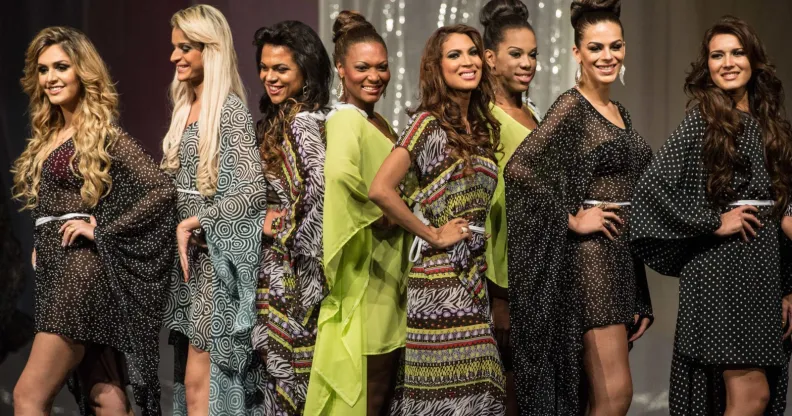Brazil to legally recognise self-identifying trans people without the need of surgery

Candidates perform on stage during the Miss T Brasil 2013 transgender beauty pageant in Rio de Janeiro on October 22, 2013. The Association of Transvestites and Transsexuals in Rio de Janeiro (Astra Rio) organizes the second edition of the beauty pageant, in which 31 contestants under 35 years old compete for the title to then participate in the Miss International Queen 2013 in Pattaya, Thailand on November 1. AFP PHOTO/YASUYOSHI CHIBA (Photo credit should read YASUYOSHI CHIBA/AFP/Getty Images)
Brazil has passed a landmark ruling which means that transgender people in the country will now be recognise according to their self-determined gender without the need for surgery.
The country’s Supreme Court voted that people can unanimously update their gender on the civil registry without undergoing gender-affirming surgery.
Transgender people can be of any age when they update their name on the registry, and will not need a psychological or medical assessment in order to update their name or gender on the national database.
It appears that the court are responding to a rise in requests for name changes on the database.
“Up until now, bureaucratic procedures had been on the rise for those who wanted the civil registry to reflect their gender identity and their names,” said Federal Prosecutor Carlos Eduardo Paz to Folha de Sao Paolo.

Miss Brazil Rafael Manfrini (2ndR) is congratulated after winning the Miss Trans Star International beauty pageant in Cornella de Llobregat on September 18, 2016. / AFP / PAU BARRENA (PAU BARRENA/AFP/Getty Images)
There is hope that the measure will provide more protection for transgender people in the country.
Trans people are in a vulnerable position in Brazil.
The country has the highest number of trans murders in the world.
In 2017 alone, 179 crossdressers and trans people were killed, with one homicide happening every 48 hours, according to data from the Brazilian-based charity tracking the murders, ANTRA.
“We have only now guaranteed a minimum of citizenship to transgender people with both of these rulings but there are still a lot of challenges to overcome,” said the group’s founder, Keila Simpson, to The Washington Blade.
“We believe that even if we had a law approved by the Congress criminalizing acts of violence against LGBT people, we would still have this many deaths, because we live in a country where it is allowed to kill, where religious fanaticism sharpens its knife daily to decimate our community, where the prejudice faced by transgender people starts inside their homes.
“It is important to say that for a marginalized community like ours, that comes from having no rights, no nothing, being able to decide our name is a lot, but we are yet to conquer our right to safe living,” Simpson added.

